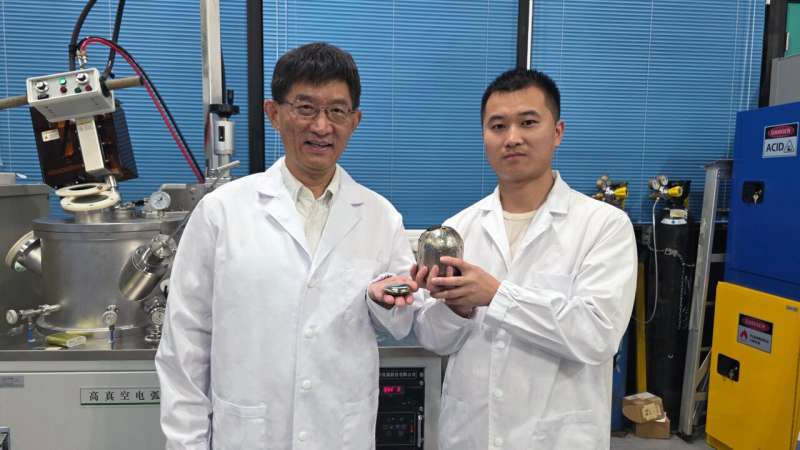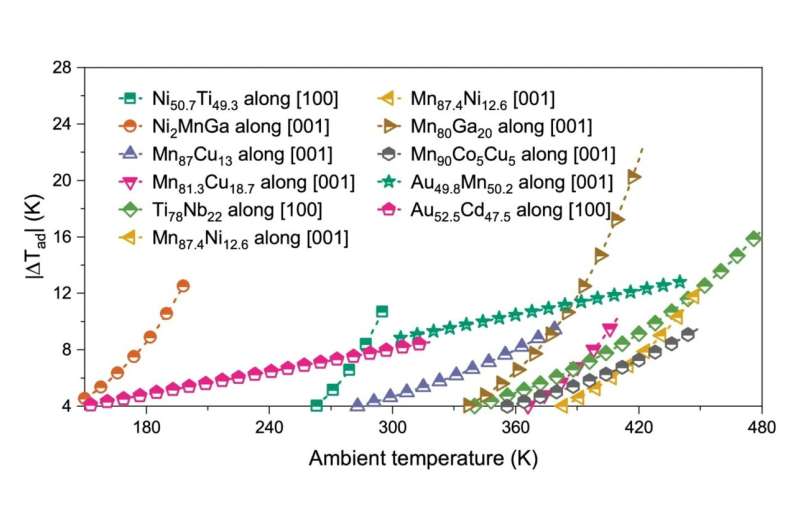Researchers at the School of Engineering of the Hong Kong University of Science and Technology (HKUST) have developed a novel elastic alloy called Ti78Nb22, which achieves remarkable efficiency for solid-state heat pumping and exhibits a reversible temperature change (ΔT) ability that is 20 times greater than that of conventional metals when stretched or compressed, offering a promising green alternative to traditional vapor-compression heating and cooling technologies.
The study is published in Nature Communications, in a paper titled “Large thermoelastic effect in martensitic phase of ferroelastic alloys for high efficiency heat pumping”.
Nearly half of the world’s energy is consumed for heating, including district heating in the building sector and process heating in various industrial sectors.
Currently, global heat demand is primarily supplied by burning fossil fuels, which produce a large amount of greenhouse gases and consume significant energy. Using heat pumps based on solid-state phase transitions is a more eco-friendly approach, but their energy efficiency remains only 50–70% of the Carnot limit. Achieving more efficient and eco-friendly heat pumping remains a global challenge.

To address this challenge, Prof. Sun Qingping from the Department of Mechanical and Aerospace Engineering (MAE)’s research team has proposed a novel heat-pumping approach that utilizes heat generated by elastic deformation, known as the thermoelastic effect (TeE).
Although TeE was discovered by scientists Kelvin, Joule, and Duhamel in the 19th century, it was long considered too weak for practical applications.
Prof. Sun’s team then fabricated a [100]-textured Ti78Nb22 martensitic polycrystal, which, when subjected to linear elastic deformation for heat pumping, exhibits a reversible temperature change (ΔT) of 4–5 K—20 times greater than conventional metals, which typically change only about 0.2 K.

Remarkably, this alloy achieves approximately 90% of the Carnot efficiency limit in a heat-pumping cycle, making it highly competitive with refrigerants used in commercial vapor-compression heat pumps.
Furthermore, the team’s research indicates that certain ferroelastic alloys could be developed with even higher thermal expansion, achieving temperature changes of up to 22 K. This work provides a promising opportunity for the green heat pumping industry and presents the first non-phase-transition-based solution for eco-friendly, high-efficiency heat supply.
Prof. Sun said, “This discovery changes the long-standing and well-established perception that the thermoelastic effect is too weak to be useful. Our research demonstrates that linear elastic deformation alone can be used for highly energy-efficient heat pumping.”
Dr. Li Qiao, the first author of this study and Research Assistant Professor from the same department, added, “As global decarbonization efforts intensify, this technology provides a transformative solution for replacing fossil fuel-based heating. We are currently developing prototype heat pumps using the alloy for industrial applications.”
More information:
Qiao Li et al, Large thermoelastic effect in martensitic phase of ferroelastic alloys for high efficiency heat pumping, Nature Communications (2025). DOI: 10.1038/s41467-025-59720-3
Citation:
Novel elastic alloy achieves 20x temperature change and 90% Carnot efficiency in solid-state heat pumping (2025, May 26)
retrieved 26 May 2025
from https://techxplore.com/news/2025-05-elastic-alloy-20x-temperature-carnot.html
This document is subject to copyright. Apart from any fair dealing for the purpose of private study or research, no
part may be reproduced without the written permission. The content is provided for information purposes only.

